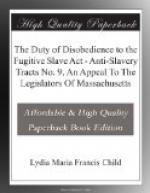“The obligation incumbent upon the Free States must be obliterated from the Constitution, at every hazard. I believe that, in the nature of things, by the law of God, and the laws of man, that clause is at this moment abrogated, so far as respects common obligation. In 1789, the Free States agreed to be field-drivers and pound-keepers for the Slaveholding States, within the limits, and according to the fences, of the old United States. But between that year and this A.D. 1854, the slaveholders have broken down the old boundaries, and opened new fields, of an unknown and indefinite extent.[1] They have multiplied their slaves by millions, and are every day increasing their numbers, and extending their field into the wilderness. Under these circumstances, are we bound to be their field-drivers and pound-keepers any longer? Answer me, people of Massachusetts! Are you the sons of the men of 1776? Or do you ’lack gall, to make oppression bitter?’
[Footnote 1: The Hon. Josiah Quincy, while in Congress, always opposed the annexation of foreign territory to the United States, on the ground of its unconstitutionality.]
“I have pointed out your burden. I have shown you that it is insupportable. I shall be asked how we are to get rid of it. It is not for a private individual to point the path which a State is to pursue, to cast off an insupportable burden; it belongs to the constituted authorities of that State. But this I will say, that if the people of Massachusetts solemnly adopt, as one man, in the spirit of their fathers, the resolve that they will no longer submit to this burden, and will call upon the Free States to concur in this resolution, and carry it into effect, the burden will be cast off; the fugitive-slave clause will be obliterated, not only without the dissolution of the Union, but with a newly-acquired strength to the Union.”.
In the spring of 1860, there was a debate on this subject in the Legislature of New York. In the course of it, Mr. Smith, of Chatauqua, said:—“How came slavery in this country? It came here without law; in violation of all law. It came here by force and violence; by the force of might over right; and it remains here to-day by no better title. And now we are called upon, by the ruling power at Washington, not merely to tolerate it, but to legalize it all over the United States! By the Fugitive Slave Bill, we are forbidden to shelter or assist the forlornest stranger who ever appealed for sympathy or aid. We are required by absolute law to shut out every feeling of compassion for suffering humanity. Fines and imprisonment impend over us, for exercising one of the holiest charities of our religion. Virtue and humanity are legislated into crime. Let us meet the issue like men! Let us assert our utter abhorrence of all human laws, that compel us to violate the common law of humanity and justice; and by so acting assert the broad principles




